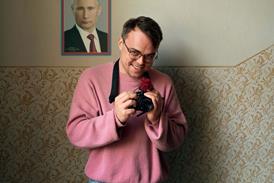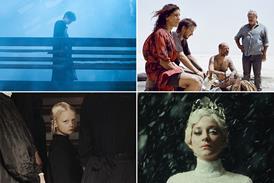Dir: Roberto Benigni. It. 2005. 114mins.
Strictly for those with high schmaltz threshholds, Roberto Benigni's
Certainly this £30m ($36m) romance,set against the backdrop of the war in Iraq, is a more effective piece ofcinema than the well-intentioned but pointless Pinocchio (2002), which lost Benigni muchof the goodwill generated by his Oscar-sweeping Holocaust comedy
The premise of
But the basslineof horror that made the Chaplinesque sentimentalityof Life Is Beautiful easier to bearis missing here. Despite some decent special effects, the war never feels real,or threatening, and the humanistic outlook (sympathetic to occupiers andoccupied alike) will be interpreted by many as fence-sitting.
The 800-screen opening in
Elsewhere, the film will playmidway between the peak of that Oscar winner (worldwide: $229m, of which$57m-plus came from the
With a mid-December rollout,
Fittingly for an adultfairytale, the film has a classic fable structure. An Italian poet, Attilio de Giovanni, (Benigni) islost in unrequited love for
The true nature of theirrelationship is revealed only at the end; but we know that Attiliohas been stalking Vittoria, and an elaborate dreamsequence set in the Roman Forum - in which a grinning Tom Waits belts out aballad on the piano that will become a recurrent theme in Nicola Piovani's obtrusive soundtrack - seems to suggest that hewants to marry her.
When Fuadphones Attilio with the news, Attiliomoves heaven and earth to get to
Like a fairytale hero, ourRoberto is required to carry out a series of challenges to wrest his true loveback from the dead: find someone who can make glycerine, track down a glucosedrip and get an oxygen mask.
In so doing, Attilio discovers a different side of
The idea that people are thesame the world over may be a cliche, but it isrendered here with a certain grace and charm - though the message might havehad more purchase if the Baghdad scenes had been shot in situ, rather than inTunisia.
What is more difficult totake is Benigni's relentless tragic-comic jester act.True, there are some funny moments - though the best of these are classicslapstick, as when a barber's chair collapses, waking Atillioup from his cat-nap. But while in Life IsBeautiful we were made to feel that everything depended on the hero'sability to laugh in the face of tragedy, here his sleepwalking through theair-brushed mayhem all around becomes, in the end, more than a littleirritating.
The impression is onlyreinforced by the hyper- real, studio-lit photography, which sprinkles icingsugar on human suffering. When we see a romanticised
Production company
Melampo Cinematagrafica
Italian distribution
01 Distribution
International sales
Focus Features
Executive producer
Elda Ferri
Producer
Nicoletta Braschi
Screenplay
Vincenzo Cerami
Roberto Benigni
Cinematography
Fabio Cianchetti
Production design
Maurizio Sabatini
Editor
Massimo Fiocchi
Music
Nicola Piovani
Tom Waits
Roberto Benigni
Nicoletta Braschi
Jean
Emilia Fox
Giuseppe Battiston

















No comments yet